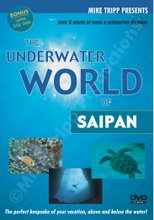Next I'd really like to suggest that Wespac has threatened my livelihood and thus stopped me from posting anything regarding the Marianas Marine Monument but, if I did it would have to be a well written joke. Fortunately they have not been able to change my opinion on the concept unlike many, many other people. Trust me there will be plenty more to come on this topic for sure!
So no, it's not Wespac's fault that posts have not been coming on a regular basis, it really just comes down to a lack of time since there is so much going on AND there has been a significant reduction in the ability to access a computer as a result of the power outages.
I intend to fill you in on some of the things that have happened over the past month in upcoming posts but right now I will start with a pretty exciting development that has taken months to put together.
State of the art First Aid Kits at Obyan, The Grotto and Lau Lau Bay.
A collaborative effort between The American Red Cross, G4S Security and Marianas Dive will soon see state of the art first aid kits available for use at 3 of our most popular Saipan shore dives. You may have read about this in last week’s tribune story here.
 Self contained in one large pelican case, these units will include basic first aid materials, automatic external defibrillators (AEDs) and oxygen (O2) delivery units. The cases will be brought to Lau Lau Bay, Obyan and the Grotto each morning by G4S security personnel and returned to headquarters at the end of each day. Already trained in first aid including CPR, the security guards will receive additional training on AED's and O2 delivery prior to implementation.
Self contained in one large pelican case, these units will include basic first aid materials, automatic external defibrillators (AEDs) and oxygen (O2) delivery units. The cases will be brought to Lau Lau Bay, Obyan and the Grotto each morning by G4S security personnel and returned to headquarters at the end of each day. Already trained in first aid including CPR, the security guards will receive additional training on AED's and O2 delivery prior to implementation. In addition the Red Cross will begin training divers interested in updating their CPR as well as getting hands on training with the AED and O2 delivery units. The first training session will get underway this Wednesday evening.
In addition the Red Cross will begin training divers interested in updating their CPR as well as getting hands on training with the AED and O2 delivery units. The first training session will get underway this Wednesday evening.The idea of bringing this life saving equipment to these popular beach dives was first discussed between myself and John Hirsh from the Saipan chapter of the Red Cross following a death of a Korean tourist at Lau Lau Bay in November 2007. I wrote about that incident here. The bottom line is no one can say for sure that having this medical equipment nearby would have saved her life BUT it very well could have.
It is reported that anywhere from 200 to 300 thousand Americans die of sudden cardiac arrest every year. It is also estimated up to 50,000 (1/4) of these deaths could have been prevented if someone had initiated the Cardiac Chain of Survival, and an automated external defibrillator (AED) had been available for immediate use at the time of the emergency.
With regards to diving, delivery of 100% oxygen is the treatment of choice for all SCUBA injuries involving suspected decompression sickness (DCS) or air embolism. As divers we are taught to administer O2 immediately (if available) should a diver describe symptoms that could possibly be related to these types of injuries. The key here is "when it is available". As a first line treatment this program ensures that divers who require it will receive O2 in a timely manner and therefore give them the best opportunity to survive.
It is hoped that ultimately these kits will never be used. However, having them, not only for divers but also for non-diving tourists and residents alike, represents a proactive approach to establishing the safest possible experience for those who are lucky enough to enjoy our unique seaside attractions.
This also sends a positive message to the international diving community and in some cases may be a factor in influencing a decision to come and dive here. In effect we are saying "we have our shit together and value your life" more than the few thousand dollars its taken the Red Cross to deliver the units and begin the training. The bottom line, "in the unlikely event" that something should go wrong we are now prepared to deal with it in the best manner possible and that is priceless to many who might wish to dive our waters or even walk up the stairs of the Grotto.





2 comments:
We obviously can't handle the big picture, so it's incremental stuff like this that keeps me hopeful.
When I've got power.
Hi Blogger,
There is a saying "Prevention is better than cure". I think you also think the same. My hobby is water sports but from last 2 years I hate the water sports especially
scuba diving because I have lost one of my friend when we are diving. If at that time proper life saving equipments are available I never lost my friend. I think you have save lives of many divers by creating such informative blog.
Post a Comment